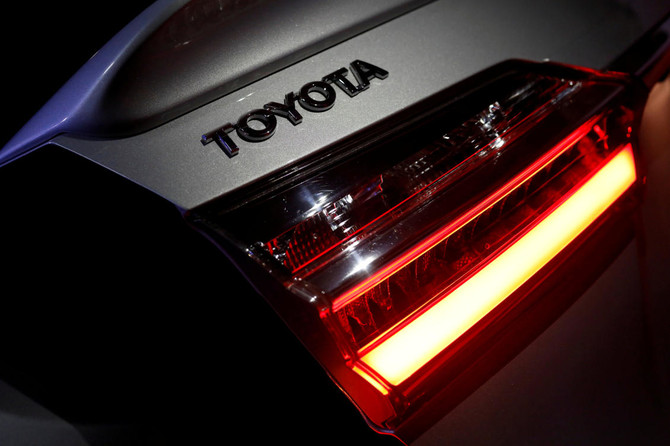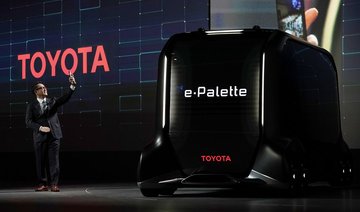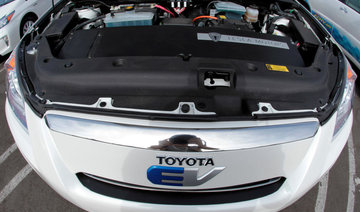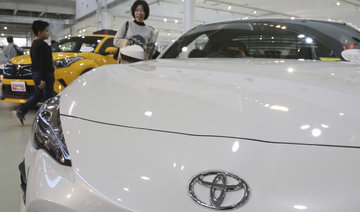MONTGOMERY, Alabama: Toyota and Mazda said on Wednesday they will build a $1.6 billion (SR6 billion) joint assembly plant in Alabama that will employ up to 4,000 workers, a boost for President Donald Trump, who wants automakers to expand US production.
Toyota President Akio Toyoda and Mazda Chief Executive Officer Masamichi Kogai joined Alabama Governor Kay Ivey in Montgomery at an event to announce the decision.
“Welcome to sweet home Alabama,” Ivey said to the two executives, after saying the anticipated 4,000 workers at the plant to be built in Huntsville would earn an average of $50,000 a year.
The plant will produce 300,000 vehicles a year and should open on a 2,500-acre former cotton field in 2021, about 14 miles from Toyota’s engine plant in Huntsville.
Trump tweeted Wednesday night that the announcement was “Good news” for the US economy.
“Companies are coming back to the US in a very big way. Congratulations Alabama!” he wrote.
Toyota plans to build Corolla cars at the plant, while Mazda will build crossover SUVs.
Alabama will provide tax incentives. Officials said the state tax incentives were worth $370 million, but they did not disclose how much the local incentives were worth.
But with US auto industry sales declining, the new plant could exacerbate overcapacity and add pressure to cut prices. US new vehicle sales fell 2 percent in 2017, after hitting a record high in 2016, and are expected to fall further in 2018.
Huntsville Mayor Tommy Battle said the plant will “provide jobs for decades to come for Huntsville and Alabama. It vaults Alabama to the top as an industry leader in producing the next generation of cars that will power our nation.”
Among US states, Alabama is already the fifth largest producer of cars and light trucks. The state has more than 150 major auto suppliers and 57,000 automotive manufacturing jobs.
Two decades ago, Alabama spent an estimated $250 million to woo Daimler’s Mercedes-Benz to put an auto plant in Tuscaloosa, sparking the birth of auto production in the state.
In September, Daimler said it would invest $1 billion to expand its Alabama Mercedes-Benz plant to start building electric sport-utility vehicles there from about 2020.
Alabama is also home to assembly plants operated by Honda Motor and Hyundai Motor. A Kia Motors assembly plant operates near the Alabama border in Georgia.
Mazda and Toyota said they still need approvals and authorization by antitrust agencies for the new joint venture. They announced a capital alliance in August and plan to jointly develop technology for electric vehicles.
Trump tweeted in March that he wanted “new plants to be built here for cars sold here.” Many automakers have announced expansions of facilities or new jobs but no other new US auto plants have been announced.
A year ago, shortly before his inauguration, Trump criticized Toyota and threatened hefty tariffs against the Japanese automaker if it built its Corolla sedan for the US market in Mexico.
In announcing plans for a new plant in August, Toyota said it would shift production of Corollas from Canada to the new venture rather than in Guanajuato and would build Tacoma pickups in Mexico instead.
Toyota North America chief executive Jim Lentz said in an interview on Wednesday that pressure from Trump was not a factor in the decision to build the plant. “These plants are going to live 30, 50 years plus and we have to make good business decisions,” he said.
Lentz said it makes sense to build Corollas because Toyota needs the volume even in a declining car market. He called the $800 million investment a “bargain” to get the additional volume.
Toyota hopes to break ground this spring after initially getting more than 100 proposed sites from 22 states.
In October, Toyota said it would scale back investment in a planned plant in Mexico by 30 percent to $700 million and cut planned annual capacity in half to 100,000 vehicles as it shuffles its production plans to meet market demands.
Over the last 30 years Toyota and other automakers from Germany and other parts of Asia have built a second auto industry in the US. Its size and employment rivals operations of the Detroit Three automakers, but with newer plants and fewer unionized workers.
US states covet auto assembly plants because they typically pay above-average wages and spin off jobs at suppliers and service companies. Southern states have been home to the majority of new auto production by German and Asian automakers. These states generally have good transportation infrastructure, business-friendly regulators and anti-union politicians.
Toyota, Mazda to build $1.6 billion assembly plant in Alabama
Toyota, Mazda to build $1.6 billion assembly plant in Alabama

Oil Updates — crude set for 3rd straight weekly gain on winter fuel demand

LONDON: Oil prices rose in early Asian trade and were on track for a third straight week of gains with icy conditions in parts of the US and Europe driving up fuel demand for heating.
Brent crude futures climbed 69 cents, or 0.9 percent, to $77.61 a barrel at 10:52 a.m. Saudi time. US West Texas Intermediate crude futures gained 66 cents, also up 0.9 percent, to $74.58.
Over the three weeks ending Jan. 10, Brent has advanced 6 percent while WTI has jumped 7 percent.
Analysts at JPMorgan attributed the gains to growing concern over supply disruptions due to tightening sanctions, amid low oil stockpiles, freezing temperatures in many parts of the US and Europe and improving sentiment regarding China’s stimulus measures.
The US weather bureau expects central and eastern parts of the country to experience below-average temperatures. Many regions in Europe have also been hit by extreme cold and will likely continue to experience a colder-than-usual start to the year, which JPMorgan analysts expect to boost demand.
“We anticipate a significant year-over-year increase in global oil demand of 1.6 million barrels a day in the first quarter of 2025, primarily boosted by ... demand for heating oil, kerosene, and LPG,” JPMorgan said in a note on Friday.
Meanwhile, the premium of the front-month Brent contract over the six-month contract reached its widest since August this week, potentially indicating supply tightness at a time of rising demand.
Oil prices have rallied despite the US dollar strengthening for six straight weeks. A stronger dollar typically weighs on prices, as it makes purchases of crude expensive outside the US.
Supplies could be further hit as US President Joe Biden is expected to announce new sanctions targeting Russia’s economy this week in a bid to bolster Ukraine’s war effort against Moscow before President-elect Donald Trump takes office on Jan. 20. A key target of sanctions so far has been Russia’s oil industry.
“Uncertainty over how hawkish Trump will be with Iran will be providing some support. Asian buyers have already been looking for alternative grades from the Middle East, with broader sanctions against Russia and Iran making this oil flow more difficult,” ING analysts said in a note on Friday.
SABIC, Almarai, SEC able to absorb fuel price hike: S&P Global

RIYADH: Major Saudi companies, including chemical company SABIC, dairy firm Almarai, and Saudi Electric Co., are well-positioned to handle the impact of higher fuel and feedstock prices introduced on Jan. 1, according to a new report.
Released by capital market economy firm S&P Global, the analysis reveals that those corporates will be able to absorb the marginal increase in production costs by further improving operational efficiencies as well as potentially via pass-through mechanisms.
This came after Saudi Aramco increased diesel prices in the Kingdom to SR1.66 ($0.44) per liter, effective Jan. 1, marking a 44.3 percent rise compared to the start of 2024. The company has kept gasoline prices unchanged, with Gasoline 91 priced at SR2.18 per liter and Gasoline 93 at SR2.33 per liter.
Despite the hike, diesel prices in Saudi Arabia remain lower than those in many neighboring Arab countries. In the UAE and Qatar, a liter of diesel is priced at $0.73 and $0.56, respectively, while in Bahrain and Kuwait, it costs $0.42 and $0.39 per liter.
“For SABIC and Almarai, the increase in feedstock prices will not affect profitability significantly. In the case of utility company, SEC, additional support will likely come from the government if needed,” the report said.
The capital market economy firm projects that SABIC will continue to outperform global peers on profitability.
“We don’t expect the rise in feedstock and fuel prices to materially affect profitability, since the company estimates it will increase its cost of sales by only 0.2 percent,” the report said.
It further highlighted that SABIC is considered a government-related entity with a high possibility of receiving support when needed.
The report also underlines that Almarai anticipates an additional SR200 million in costs for 2025, driven by higher fuel prices and the indirect effects of increased expenses across other areas of its supply chain.
“We believe Almarai will continue focusing on business efficiency, cost optimization, and other initiatives to mitigate these impacts,” the release stressed.
With regards to SEC, S&P said that an unrestricted and uncapped balancing account provides a mechanism for government support, including related to the higher fuel costs.
“We believe any increased fuel cost will be covered by this balancing account,” the report said.
The study further highlights that the marginal increase “could significantly affect wider Saudi corporations’ profit margins and competitiveness.”
The S&P data also suggests that additional costs will be reflected in companies’ financials from the first quarter of 2025.
“Saudi Arabia is continuing its significant and rapid transformation under the country’s Vision 2030 program. We expect an acceleration of investments to diversify the Saudi economy away from its reliance on the upstream hydrocarbon sector,” the report said.
“The sheer scale of projects — estimated at more than $1 trillion in total — suggests large funding requirements. Higher feedstock and fuel prices would help reduce subsidy costs for the government, with those savings potentially redeployed to Vision 2030 projects,” it added.
Lenovo to produce ‘Saudi Made’ PCs by 2026 following $2bn Alat deal closure

RIYADH: Chinese tech giant Lenovo is set to manufacture millions of computer devices in Saudi Arabia by 2026, following the completion of a $2 billion investment deal with Alat, a subsidiary of the Public Investment Fund.
First announced in May, the partnership has now received shareholder and regulatory approvals, paving the way for Lenovo to establish a regional headquarters and a manufacturing facility in the Kingdom.
The deal marks a significant step in aligning Lenovo’s growth ambitions with Saudi Arabia’s Vision 2030 goals of economic diversification, innovation, and job creation, the company said in a press release.
The factory will manufacture millions of PCs and servers every year using local research and development teams for fully end-to-end “Saudi Made” products and is expected to begin production by 2026, it added.
“Through this powerful strategic collaboration and investment, Lenovo will have significant resources and financial flexibility to further accelerate our transformation and grow our business by capitalizing on the incredible growth momentum in KSA and the wider MEA region,” Yang said.
He added: “We are excited to have Alat as our long-term strategic partner and are confident that our world-class supply chain, technology, and manufacturing capabilities will benefit KSA as it drives its Vision 2030 goals of economic diversification, industrial development, innovation, and job creation.”
Amit Midha, CEO of Alat, underscored the significance of the partnership for both Lenovo and the Kingdom.
“We are incredibly proud to become a strategic investor in Lenovo and partner with them on their continued journey as a leading global technology company,” said Midha.
“With the establishment of a regional headquarters in Riyadh and a world-class manufacturing hub, powered by clean energy, in the Kingdom of Saudi Arabia, we expect the Lenovo team to further their potential across the MEA region,” he added.
The partnership is expected to generate thousands of jobs, strengthen the region’s technological infrastructure, and attract further investment into the Middle East and Africa, according to the press release.
In May, Lenovo raised $1.15 billion through the issuance of warrants to support its future growth plans. The initiative, which was fully subscribed by investors, signals confidence in Lenovo’s strategic approach and its plans for global expansion.
The investment deal was advised by Citi and Cleary Gottlieb Steen & Hamilton for Lenovo, while Morgan Stanley and Latham & Watkins represented Alat.
Lebanon’s bonds climb as parliament elects first president since 2022

LONDON: Lebanon’s government bonds extended a three-month long rally on Thursday as its parliament voted in a new head of state for the crisis-ravaged country for the first time since 2022.
Lebanese lawmakers elected army chief Joseph Aoun as president. It came after the failure of 12 previous attempts to pick a president and the move boosts hopes that Lebanon might finally be able to start addressing its dire economic woes.
Lebanon’s battered bonds have almost trebled in value since September when the regional conflict with Israel weakened Lebanese armed group Hezbollah, long viewed as an obstacle to overcoming the country’s political paralysis.
Most of Lebanon’s international bonds, which have been in default since 2020, rallied after Aoun’s victory was announced to stand between 0.8 and 0.9 cents higher on the day and at nearly 16 cents on the dollar.
They have also risen almost every day since late December, although they remain some of the lowest priced government bonds in the world, reflecting the scale of Lebanon’s difficulties.
With its economy still reeling from a devastating financial collapse in 2019, Lebanon is in dire need of international support to rebuild from the war, which the World Bank estimates to have cost the country $8.5 billion.
Closing Bell: Saudi main index closes in green at 12,097

RIYADH: Saudi Arabia’s Tadawul All Share Index rose on Thursday, gaining 9.01 points, or 0.07 percent, to close at 12,097.75.
The total trading turnover of the benchmark index was SR7.48 billion ($1.99 billion), as 96 stocks advanced, while 133 retreated.
The MSCI Tadawul Index decreased by 3.28 points, or 0.22 percent, to close at 1,510.14.
The Kingdom’s parallel market, Nomu, surged, gaining 251.24 points, or 0.82 percent, to close at 31,027.39. This comes as 56 of the listed stocks advanced, while 32 declined.
The best-performing stock was Nice One Beauty Digital Marketing Co. for the second day in a row, with its share price increasing by 7.69 percent to SR49.
Other top performers included Fawaz Abdulaziz Alhokair Co., which saw its share price rise by 6.5 percent to SR14.74, and Abdullah Saad Mohammed Abo Moati for Bookstores Co., which saw a 4.42 percent increase to SR35.45.
Arabian Pipes Co. and Dr. Sulaiman Al Habib Medical Services Group also saw positive change with their share prices moving up by 4.10 percent and 3.89 percent to SR12.70 and SR298.80, respectively.
The worst performer of the day was Salama Cooperative Insurance Co., whose share price fell by 5.88 percent to SR19.52.
Almoosa Health Co. and Al Hassan Ghazi Ibrahim Shaker Co. also saw declines, with their shares dropping by 5.13 percent and 3.91 percent to SR133.20 and SR28.25, respectively.
On the announcements front, Riyad Bank declared its intention to fully redeem its $1.5 billion fixed-rate reset tier 2 sukuk, issued in February 2020, on Feb. 25, 2025.
According to a Tadawul statement, the sukuk originally maturing in 2030, will be redeemed at face value in accordance with the terms and conditions. The redemption, approved by the regulators, will include any accrued but unpaid periodic distributions.
On the redemption date, Riyad Sukuk Limited will deposit the full amount into the accounts of sukuk holders, marking the completion of the issuance. This redemption will conclude the sukuk’s life, with no remaining value post-redemption.
Riyad Bank ended today’s trading session edging up by 0.91 percent to SR27.85.




















